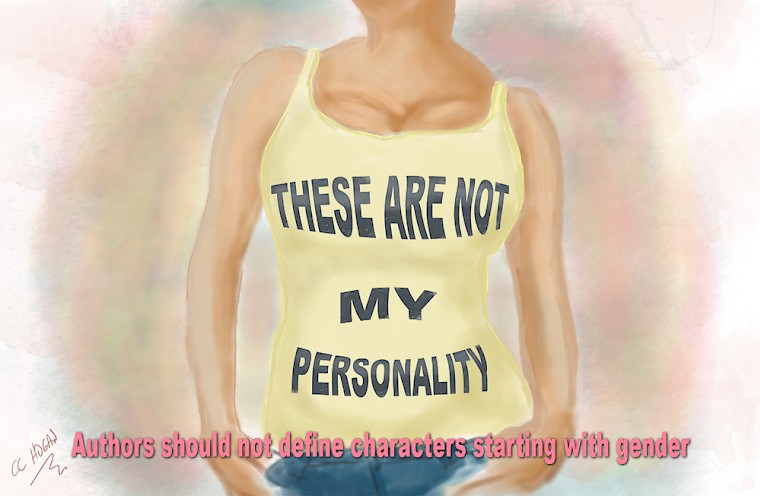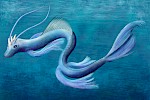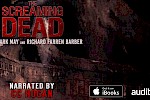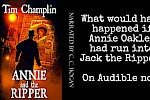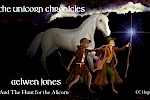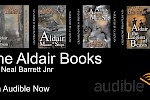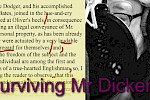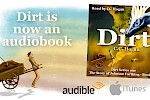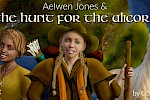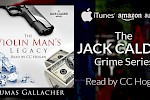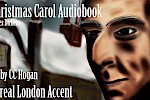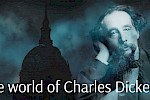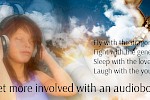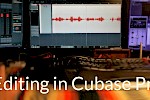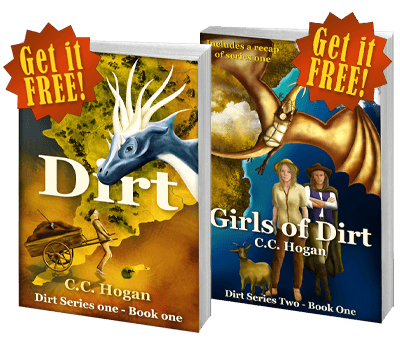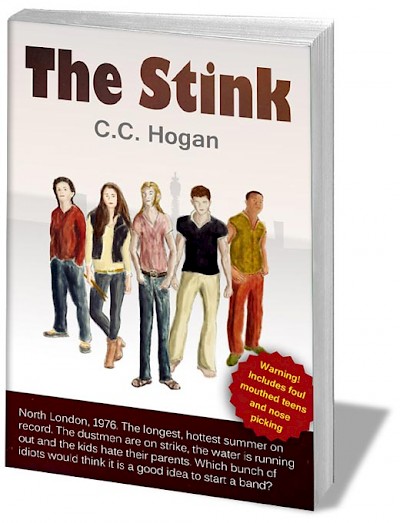As a writer, you have to forget your own gender
Sometimes I think I have been born with the wrong gender. I don't mean that I feel like I am actually a woman or that I need to rush off for gender reassignment, but that if I am to write truly great female characters, then something about me being a man makes that impossible.
This is not a lack of self-confidence in myself as a writer, but about being conscious of an accusation I have heard from some women friends over the years - I am a man, therefore it is simply not credible that I can ever understand what it is to be a woman.
To a certain degree I think this is true; certainly from the physical point of view. I do not have a womb and cannot menstruate, my hormone balance is different so I do not have the same hormone changes as the female of my species, and I can quite honestly say that have never suffered from "sore tits." But being a woman, a man or any other type of breathing, thinking person surely is far more than a set of hormones.
My latest foray into the world of creating characters is Dirt, a High Fantasy epic set on a world called Dirt that follows the stories of humans and dragons as they fight for freedom. Although the primary character in the opening books is male, a young human, many of the main characters are female, and in the second series, of the five lead characters, four are female, one of those a dragon and one of the women is a lesbian.
Although Dirt is a fantasy, I have made a very determined choice that magic does not lead the plot. There is magic, of a sort, but it cannot blow up mountains, turn people into frogs or solve intractable plot problems with a convenient wave of a magic wand. The heroes win at the end of the day because they are determined, clever and resolute, but their tasks are far from easy.
My female leads have to not only be strong and clever but have to be realistic too. It has been very important that they, both human and dragon, are recognisable to readers, especially women readers. I wanted them to say, "Yes, that would make me cry too." Or, "I wish I was tough like her," and even, "Damn, that would really piss me off!" I certainly did not want to create the fantasy stereotypes that we have seen so often. This includes the male characters too. My heroes nearly give up and run away several times, are far from infallible and dress appropriately - so no bare flesh in the cold or when running through woodland or when fighting something that carries a sharp, pointy thing!
To achieve this, I had to decide whether I could put myself "into the head of a woman."
Who am I?
I think it is safe to say that after half a century I have a reasonable appreciation of who I am, but I have realised in the last year of solid writing that, a little like a trainee shrink, to understand my characters, I have to understand myself.
This means I have to get past anything stereotypical that society imposes, any artificial limits that people think exist for our psyche, and instead think about the core person; me. And then, I have to do likewise for my characters.
I have a growing suspicion that if you take away all of society's ideas of male and female, even some of the more modern progressive ideas, and you also take away any physical, practical differences, when you look at the remaining fundamental differences between men and women, you are going to be presented with a very short list. In fact, I am not completely convinced you are going to find many at all!
Let's look at crying. Good one this because it is generally accepted that women cry far more easily than men. So, does this mean that women find things more upsetting than men? Or they understand emotional situations better or more deeply than men? Or does it mean that they just leak more easily? Is it even really true?
I have been with an interesting assortment of girlfriends over the years, mostly because I do not seem to be attracted to any one type of person. A couple I have been out with have "leaked" at every opportunity, especially during films. Another couple I can think of didn't seem to cry over anything. Personally, I can cry dead easily during a film. This is not because I am "in touch with my feminine side," or "a bit of a girl." It is simply because I do not think that just because I am a bloke and straight I shouldn't cry. Also, I like getting emotionally involved with stories, and if you do so, you would have to be very hard-hearted not to be affected by a well-told tale.
So, taking just that one emotion, and not wishing to list everything we feel or think, actually there is probably very little difference between the sexes as such, but more a difference between different personalities as long as society is happy about letting personalities shine in the open.
Back to my characters.
If I decide that is true, then when writing a female character I have two choices: I can try and somehow pretend I am a girl, be girly and then write from the girly perspective, or I can forget all about whether I am a man or woman and just write the character for who they are. Having done that, I can then glue their physical body back onto them and see what happens next.
What has helped a little here has been the dragons. The differences between male and female dragons is less from the physical point of view than in humans. Male red dragons and sea dragons tend to be bigger than females, but the sexes are pretty much similar in size and strength in Desert Dragons. Dragons are very independent and are not sexist at all. They do pair up (like a sort of loose marriage) and spend lifetimes together, but most dragons stay single and have a lot of fun with a lot of other dragons. Because of these very few facts (since I have made them up), and having no dragon society imposing differences, I can start with a clean slate. I have found it very, very easy writing both female dragons and male dragons and I have been able to create my own differences without compromising strength of character, and allow the dragons to develop naturally. Consequently the fact that a dragon is male or female seems to be more important to the human characters than it is to the dragons themselves (apart from Be-Elin who turns out to be the randiest dragon ever, but that is not my fault.)
Having had the fun of the dragons, I have simply taken the same approach with female and male humans.
Do not impose gender rules
I can quite honestly say I have not once in these books thought of an event and then asked myself the question, "how would a woman react?"
Whether you are a male or female author writing about a male or female character, I believe that is the biggest mistake you can possibly make. It MUST be, "How will this particular character react?" And forget their gender.
My favourite character in Dirt is Mistry. Mistry is female, young, and very strong. She fights harder than anyone else, is more driven than anyone else, and takes more risks than anyone else. But she also hurts more than anyone else and, because she is the youngest of the main characters, suffers from insecurities and doubts more than the others.
However, none of this is because she is female. Some of it is definitely because she is young, but most of how she reacts is because she is Mistry and Mistry is complicated.
Where she is brought up women are not allowed to own property and are married off at sixteen by an arranged or even forced marriage. Mistry escapes this fate and fights against the system. But it is not because she is some sort of campaigning "feminist," but because she fights against anything that she sees as unfair, and this is terribly unfair.
It was vital for me that she was not seen as a tomboy, again a society imposed stereotype, or as somehow different to other women, but that she was seen as Mistry, and her gender completely unimportant except where she has to react to the social environment.
And it works, I hope. A couple of women friends have said Mistry is definitely a woman, all the way through, and yet I have not once tried to make her a woman. The closest I have got in the book is she is short, pretty and has big brown eyes. From then on she is just the person dealing with her own difficult story.
I think that is the trick, you see. I think the women who have read her story have added the rest of what it might or might not be to be female themselves. I couldn't tell you what that was, but it will be certainly from their own experience, not mine. I think when men read her they will do the same thing, though they might come up with a different impression. I am not sure about that, but I don't mind if they do.
So, can a man write a convincing female character? Or can a woman write a convincing male character?
Yes, most definitely. But the minute you try and force the character to be male or female, try to impose masculinity or femininity, then I think it all goes wrong. This is part of the problem I have with some romantic prose; for instance the traditional Mills and Boon style offering. The writers go out of their way to make sure the women are unmistakably women and likewise with the men, and I think that simply fails to be convincing. They end up with a stereotype that does not really exist.
In real life, we see a woman shape, and from then on we judge them by that set of criteria - a person may even judge themselves in the same way. As writers, we need to stick to being honest about the character and ignore the shape. If the reader layers their own stereotypical judgements on top, just like in real life, then we should not stop them, but neither should we force them down any particular route.
As long as your characters are honest and true, then their masculinity or femininity will only be at the whim of the tale and the audience, and that is how it should be.

